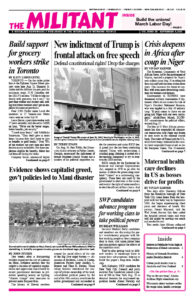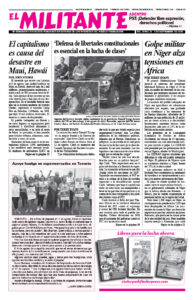The Economic Community of West African States, led by the government of Nigeria, rejected a proposal by Niger’s new military junta Aug. 21 to relinquish their rule and hold elections within three years. This increases the threat of conflict, with even more devastating conditions for workers and farmers.
Governments in ECOWAS have threatened military intervention if diplomatic efforts do not restore the rule of Niger’s President Mohamed Bazoum, who was toppled in a July 26 military coup. “If push comes to shove we are going into Niger with our own contingents,” Abdel-Fatau Musah, ECOWAS’ commissioner for political affairs, warned Aug. 17.
The bloc of 15 West African governments has also suspended all commercial transactions with Niger and frozen its state assets in the regional central bank. The rulers of France and the U.S., which have troops stationed in the country, have suspended financial aid, as has the European Union. The 55-member nations of the African Union suspended Niger Aug. 22 and say they’ll impose sanctions on military junta members.
“Nigeria has cut the power supply to Niger,” Ibrahim Hamadou, general secretary of l’Union des Syndicat Libres des Travailleurs du Niger, told the Militant in a phone interview Aug. 17. “The biggest impact is on hospitals. Operations have been cancelled.”
“Food is going bad because there is no refrigeration,” he said, adding that the price of a bag of rice has gone up by a third.
“If they leave the border like this, people will die,” a Nigerien truck driver who has spent the past two weeks waiting to cross into Niger, told France 24. “There’s no work. From morning until night I have nothing to eat.”
“People are suffering under sanctions, but they’re opposed to military intervention,” Hamadou told the Militant. “My union supports the coup. I believe that it was carried out in a bad way, but now a fight for liberation from the French is taking place.
“Before the coup there was already famine,” Hamadou said. “With Jihadists running free in some areas, peasants flee and they’re unable to work the land. The longer the land is left idle, the harder it is to make it productive again.”
An attack by an Islamist terror group in the western part of the country Aug. 15 killed 17 Nigerien soldiers. Another 20 were wounded. Hundreds of thousands of families have been driven out of their villages by the Islamist forces.
Boubacar Daoudou, who made his living selling household goods, fled Tassia, in western Niger, with his wife and two children after his father and uncle were killed.
When they arrived in nearby Gotheye, they received a warm welcome and aid. But “I’m tired of asking for more food and water, not being able to work and earn my own money,” he told reporters. “I am an unemployed person, against my will. My greatest desire would be to return to my native village, where I could work, build my house, and contribute to the local economy.”
More than 80% of the families in Niger earn a living as farmers or herders. The country of 25 million is one of the poorest in the world. Life expectancy is 63 years. Only the southern third of the country’s land can be used for agriculture, as the rest is desert, which continues to expand by a quarter of a million acres a year.
In other areas the land has been destroyed by pollution. After mining uranium for almost 50 years, a French company, Orano, shut down operations in Arlit, Niger, in 2021, leaving 20 million tons of radioactive mud there. The soil and underground water — that 100,000 people living in the area drink — are contaminated.
On Aug. 21 a convoy of 300 trucks, mainly loaded with food, reached Niger’s capital, Niamey, from Burkina Faso, the last open border.
Across the Sahel region Islamist terror groups have taken advantage of a deep social and economic crisis and distrust toward the former colonial powers to extend their influence, wreaking havoc with the lives of working people. The failure of Paris’ military to defeat the Islamists has deepened opposition to intervention by French forces among local populations.
Since 2020, governments in Burkina Faso, Guinea and Mali have been overthrown. The military regimes of Mali and Bukina Faso have expressed support for the coup in Niger, saying ECOWAS intervention would be a “declaration of war” against them too.

